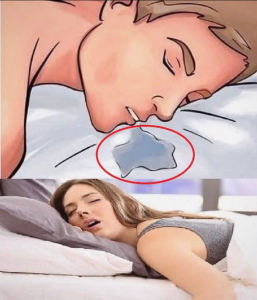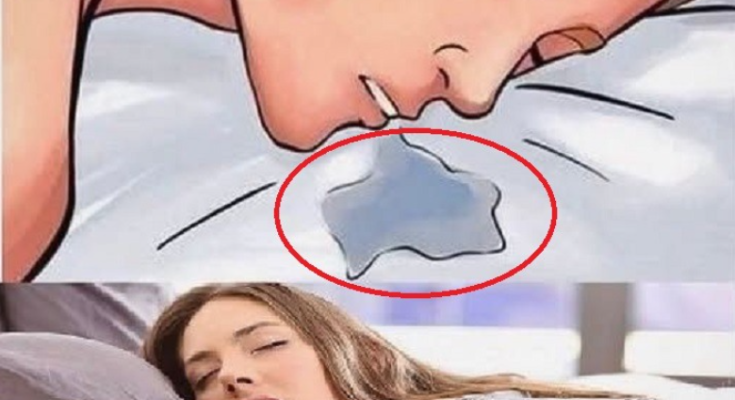Drooling while sleeping is something many people experience at least occasionally, and while it can sometimes feel embarrassing or uncomfortable, it’s more common than most realize. The medical term for excessive drooling is sialorrhea or hypersalivation, and it occurs when saliva pools in the mouth and escapes because the person is too relaxed or positioned in a way that makes swallowing difficult. But beyond the surface, drooling while sleeping can reveal quite a lot about what’s happening in your body and, in particular, about the condition of your brain and nervous system.
Why We Drool in the First Place
Saliva is produced constantly by glands in the mouth, and under normal conditions, we unconsciously swallow it throughout the day. When you’re awake, your brain actively monitors and controls these reflexes. But during sleep, especially deep stages, the brain slows down certain functions to allow the body to rest. If you happen to be sleeping on your side or stomach, gravity naturally pulls saliva out of the mouth, leading to drooling. In those cases, drooling is mostly harmless and linked to sleep position.
However, when drooling is excessive, frequent, or paired with other symptoms, it can sometimes point to neurological or medical issues, many of which involve the brain’s communication with muscles in the mouth and throat.
What It Might Say About Your Brain
-
Good Sleep Quality
Surprisingly, mild drooling can actually be a sign of deep, restorative sleep. When you reach the rapid eye movement (REM) stage or deep non-REM sleep, your muscles relax fully, including those around your mouth and throat. This relaxation can make swallowing less frequent, which causes saliva to pool. Some sleep experts argue that occasional drooling may indicate that you’re achieving healthy, restful sleep cycles. -
Neurological Signals and Muscle Control
On the other hand, excessive drooling may suggest your brain isn’t efficiently sending signals to the muscles that control swallowing. Conditions like Parkinson’s disease, amyotrophic lateral sclerosis (ALS), or the aftereffects of a stroke can impair these pathways. In these cases, drooling is less about sleep quality and more about disrupted neurological communication. -
Sleep Disorders
Drooling can be a symptom of sleep disorders, particularly sleep apnea. When the brain and body struggle for proper airflow at night, mouth breathing increases, which dries out the mouth and causes more drooling. Sleep apnea has direct links to brain health because it reduces oxygen levels, potentially affecting memory, focus, and even raising the risk of stroke or dementia over time. -
Brain Inflammation or Infection
Though rare, drooling can sometimes accompany more serious brain-related issues like meningitis, encephalitis, or brain injuries. These conditions affect the brain’s ability to regulate muscle function and swallowing reflexes. In such cases, drooling is usually accompanied by fever, confusion, or neurological deficits. -
Mental Stress and Medication Effects
The brain’s chemistry also plays a role. Stress and anxiety can influence muscle tension and swallowing reflexes. Certain medications—particularly those affecting the nervous system, such as antidepressants or drugs for epilepsy—can alter saliva production or muscle control, resulting in nighttime drooling.
Other Contributing Factors
Not every instance of drooling is directly tied to the brain. Other factors include:
-
Allergies or Sinus Infections: Blocked nasal passages force mouth breathing, increasing drool.
-
Dental or Oral Health Issues: Misaligned teeth, enlarged tonsils, or poorly fitting dental appliances can interfere with normal swallowing.
-
Digestive Disorders: Conditions like acid reflux may irritate the throat, making swallowing less frequent during sleep.
When to Be Concerned
A little drool on the pillow now and then isn’t usually cause for alarm. But if you notice it happening frequently, in large amounts, or accompanied by other troubling signs like choking at night, persistent sore throat, daytime fatigue, or difficulty swallowing while awake, it’s worth consulting a doctor. These could be signs of neurological conditions, sleep apnea, or other medical issues that require treatment.
What You Can Do About It
-
Adjust Sleep Position: Sleeping on your back can reduce drooling since saliva flows down the throat more easily.
-
Check for Nasal Issues: Treating allergies or clearing nasal congestion can lessen mouth breathing.
-
Improve Sleep Hygiene: Getting consistent, high-quality sleep helps regulate the brain’s natural sleep-wake cycles.
-
Medical Support: For persistent cases, doctors may suggest speech or swallowing therapy, medication adjustments, or, in rare cases, minor surgical procedures to reduce salivary gland activity.
-
Address Underlying Sleep Disorders: A sleep study can reveal whether conditions like sleep apnea are behind the drooling.
The Bottom Line
Drooling while sleeping may seem trivial, but it’s actually a fascinating signal from your body. Sometimes it’s just gravity and relaxation at work, showing that you’re reaching deep rest. Other times, it can indicate the brain isn’t sending signals efficiently to your swallowing muscles, or that an underlying disorder is affecting your breathing and sleep quality. In either case, paying attention to it—and seeking advice if it becomes excessive—can give you important insights into both your sleep health and your brain’s functioning.
In a way, drool is like a tiny messenger: sometimes it whispers that you’ve rested well, and other times it warns that something in the complex system of brain and body needs closer attention.


